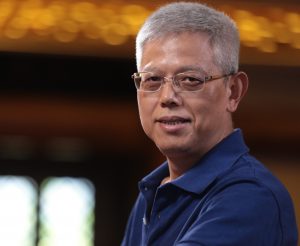Supported by the Glorisun Global Network of Buddhist Studies and the UC-Berkeley Buddhist Studies Center, UBC’s Glorisun visiting professor GONG Jun is to give a seminar presentation at the Center, 5pm- 6:30pm, October 16, 2018:

Timothy Richard
Abstract:
This presentation focuses on the political rhetoric hidden in the English translation by Timothy Richard (1845-1919) of the Awakening of Faith (Dasheng qixin lun 大乘起信論), one of the most popular Buddhist texts in East Asia. It first treats Richard’s translation as an important event in the intellectual history by placing it back to the distinctly different veins of Buddhist studies respectively in China and in the West since the nineteenth century. It then explores Richard’s creative interpretations for the two key Buddhist concepts of Mahāyāna and Hinayana as well as his hidden writing strategies while translating and interpreting Buddhist texts. Finally, the speech also analyzes in detail the ‘Western “matching-meaning”’ (yang geyi 洋格義) as expressed in the translation of the Awakening of Faith, bringing to light Richard’s Christian reconstruction of Buddhist scriptures over the course of translation.
About the Speaker:
Prof. GONG Jun 龔隽  is currently based in the Department of Philosophy at Sun Yat-sen University (Guangzhou, China). His research interest covers Chan Buddhism, the intellectual history of Chinese Buddhism, and Chinese philosophy. Born in 1964 in Jiangxi, China, Gong studied philosophy and Buddhism at Wuhan University and East China Normal University in Shanghai. Having finished his PhD, Gong started his academic career at South China Normal University in Guangzhou in 1993, and then moved to Sun Yat-sen University in 2001. He stayed one year at Harvard University (2002-2003) as Harvard-Yenching visiting scholar. Being solidly trained in both Chinese philosophy and Buddhist literature, Gong has authored a number of influential monographs such as Dacheng qixin lun yu Foxue zhongguohua 大乘起信論與佛學中國化 (The Awakening of Faith and Sinolization of Buddhism, 2001), and Chanshi gouchen 禅史鈎沉 (Essays Investigating the Hidden Historical Facts about Chan Buddhism, 2006), etc. Overall, Gong’s work demonstrates a very fine combination of philosophical debates with textual analysis. He also dedicates to dealing with methodological issues, his Zhongguo Chanxue yanjiu rumen 中國禅學研究入門 (Introduction to the studies in Chinese Chan Buddhism; 2009; co-authored with CHEN Jidong 陳繼東), for instance, offers methodological guidance and is deemed a must for junior researchers in this field.
is currently based in the Department of Philosophy at Sun Yat-sen University (Guangzhou, China). His research interest covers Chan Buddhism, the intellectual history of Chinese Buddhism, and Chinese philosophy. Born in 1964 in Jiangxi, China, Gong studied philosophy and Buddhism at Wuhan University and East China Normal University in Shanghai. Having finished his PhD, Gong started his academic career at South China Normal University in Guangzhou in 1993, and then moved to Sun Yat-sen University in 2001. He stayed one year at Harvard University (2002-2003) as Harvard-Yenching visiting scholar. Being solidly trained in both Chinese philosophy and Buddhist literature, Gong has authored a number of influential monographs such as Dacheng qixin lun yu Foxue zhongguohua 大乘起信論與佛學中國化 (The Awakening of Faith and Sinolization of Buddhism, 2001), and Chanshi gouchen 禅史鈎沉 (Essays Investigating the Hidden Historical Facts about Chan Buddhism, 2006), etc. Overall, Gong’s work demonstrates a very fine combination of philosophical debates with textual analysis. He also dedicates to dealing with methodological issues, his Zhongguo Chanxue yanjiu rumen 中國禅學研究入門 (Introduction to the studies in Chinese Chan Buddhism; 2009; co-authored with CHEN Jidong 陳繼東), for instance, offers methodological guidance and is deemed a must for junior researchers in this field.

